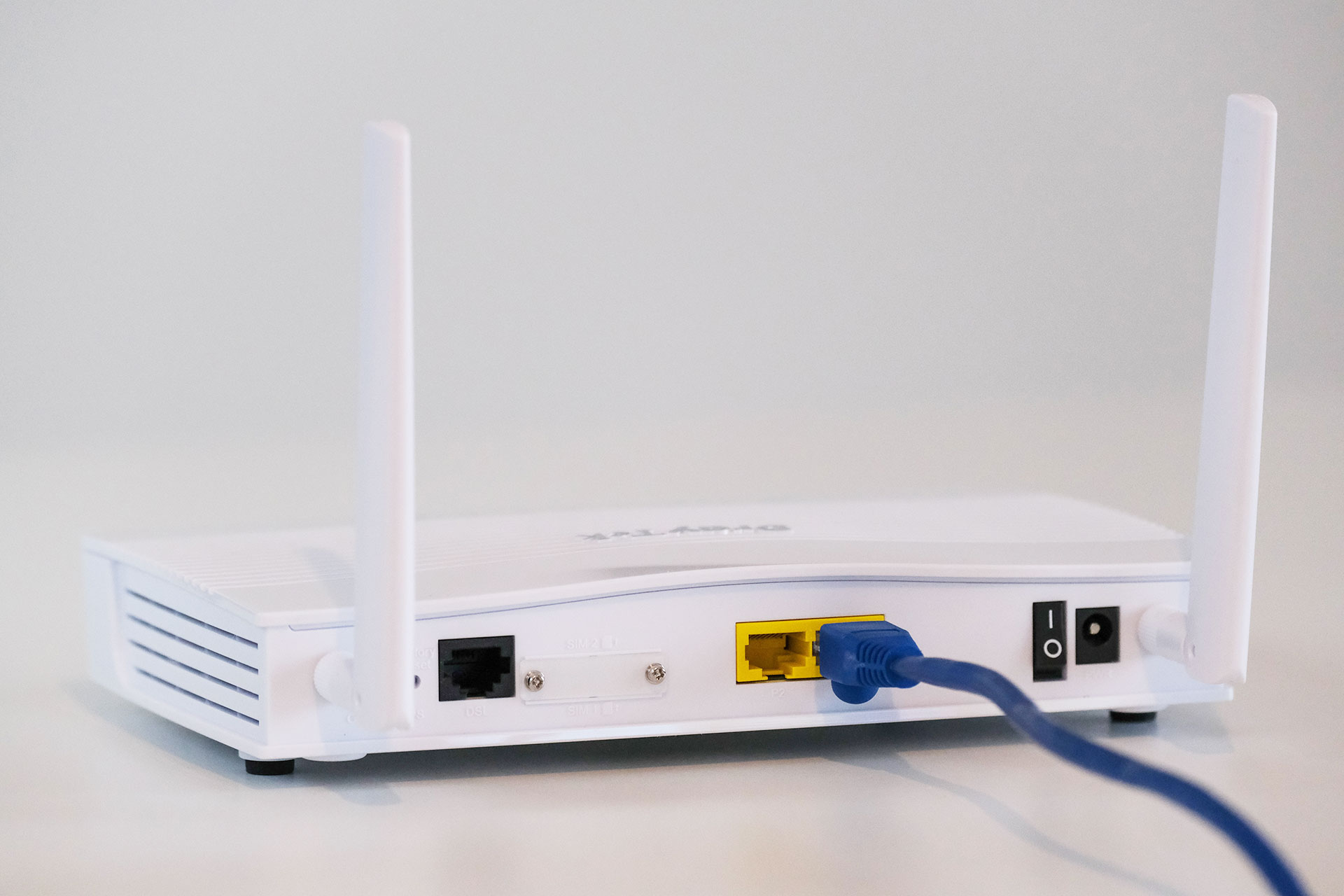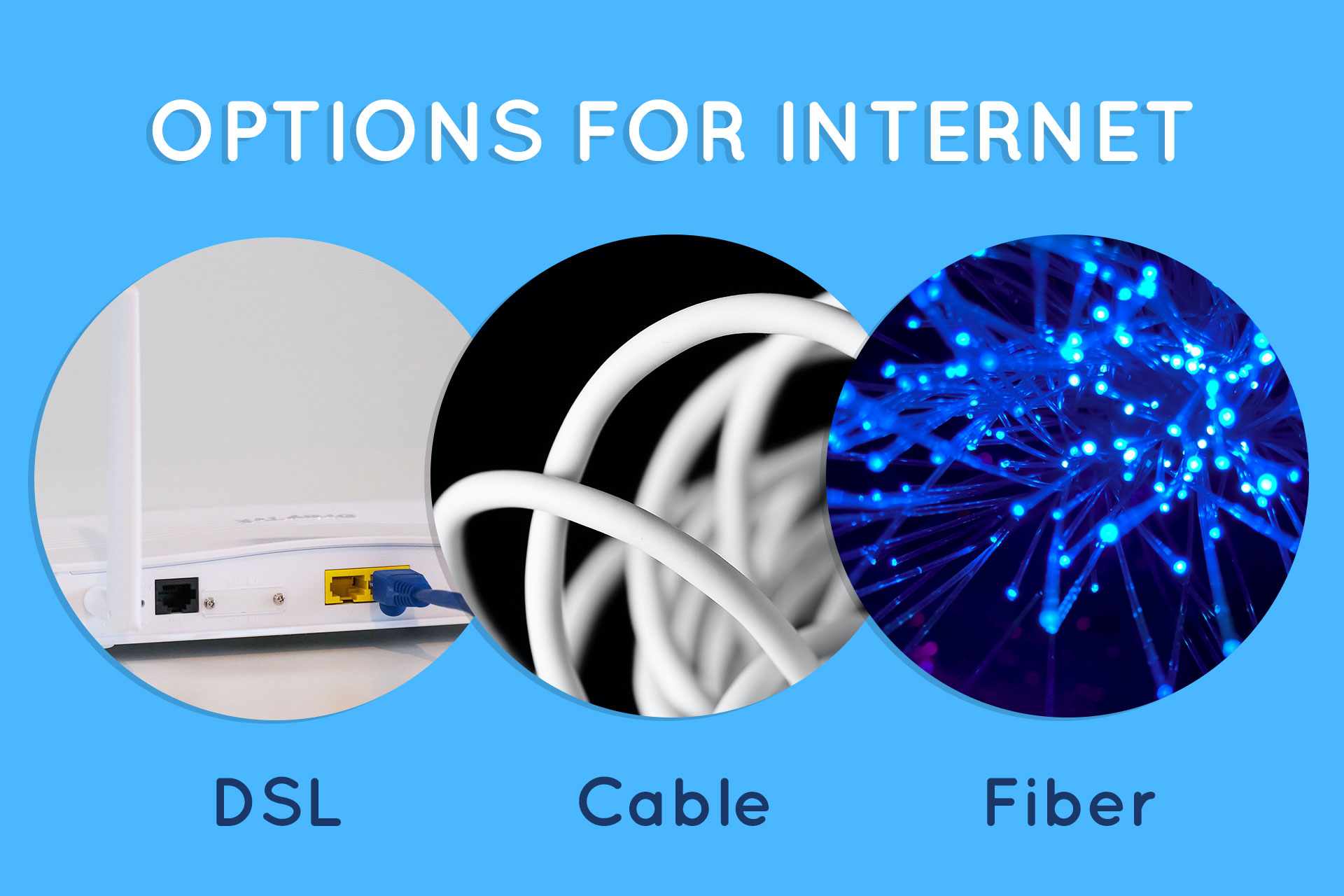DSL, Cable and Fiber: Options for Internet
In today’s digital age, the workplace comes to a halt without a fast and reliable internet connection. Whether you are the only employee in your small business or responsible for multiple locations of a large company, choosing the right internet provider can be a daunting task. You must first decide what type of internet connection meets your needs. Digital subscriber line (DSL), cable, and fiber are the most common internet connections. Each connection comes with varying price, bandwidth, download and upload speeds. Gabbit provides top-tier VoIP service for all size businesses, and our experts want you to know the pros and cons of these internet connections to determine what is best for your business.

DSL
DSL (Digital Subscriber Line) is a type of internet connection that utilizes existing telephone lines to transmit data. Many small and medium-sized businesses rely on DSL for their internet connectivity needs. Advantages of DSL start with availability. DSL is widely available in most areas, even in remote or rural geography where cable or fiber optic internet may not be available. DSL is also less expensive than other internet options. This makes it an attractive option for small businesses that want reliable internet service, but need to keep costs low. DSL speeds can often rival cable or fiber, and this makes it an even better bang for your buck if budget is a deciding factor.
Reliable. DSL is generally considered a relatively reliable internet option. Albeit slow, it is not affected by weather or other external factors, unlike satellite internet, which may experience disruptions during inclement weather.
The disadvantages of DSL include limitations of distance and speed. DSL connection limited by distance means that if a business is located too far from the nearest telephone exchange, DSL speeds may be significantly slower. In addition, DSL connections generally offer lower bandwidth than other internet options, which may impact businesses that require high data usage. Because DSL relies on telephone networks, DSL speeds can slow down during peak usage hours when many people are using the internet. This may affect businesses that operate during these hours and require consistent internet speeds. Lastly, DSL connections typically offer slower upload speeds than other internet connections like fiber, which may cause issues for businesses that require uploading large files or video conferencing.

Cable internet
Cable internet is a form of high-speed connection that uses a cable television infrastructure to provide access to end users. Basically, the network that provides your cable TV connection is the same one that allows you to access the internet. The first advantage of cable internet comes from its speed. Cable internet is faster than DSL. This makes it ideal for businesses that do a lot of streaming, downloading, or uploading data. With cable internet, you can enjoy speeds of up to 100 Mbps, enabling fast downloads and uploads, which is perfect for video conferencing, online seminars, and file sharing. Cable internet is less prone to signal interference, which makes cable a safe bet for businesses that rely on constant internet access. Cable internet is also very cost-effective because the infrastructure has been in place long time. This means more providers and more competition with pricing of only half the cost of some other internet services. Cable internet is readily available and perfect for companies that need fast and reliable internet access but cannot afford to install fiber-optic internet.
Cable internet has some drawbacks that can be attributed to shared bandwidth. It means that internet speeds may decrease based on how many people are using the network at the same time. This can be a hindrance to businesses that require constant internet access to work smoothly, but it can be overcome by purchasing higher plans to gain faster speeds. You might also consider the security concerns that come along with cable internet. Because cable internet is a shared service, it is prone to security risks, making it easier for hackers to access business networks. Cable internet connections may be vulnerable to malware or virus attacks, which can affect business operations and data security. You can mitigate these concerns with the use of VPNs (Virtual Private Networks), firewalls, and other security systems.

Fiber internet
Fiber internet relies on fiber-optics, a type of technology that transmits data by sending light along thin glass fibers. Fiber broadband is powered by fiber optic cables. This is different from traditional cable internet, which transmits information by sending electricity over copper wires. The most significant benefit of fiber internet is its fast speed. Unlike traditional options, fiber-optic cables transmit data using light signals, which ensures consistent and lightning-fast speeds. With fiber-optic internet, you can upload, download, and stream content without facing any lag or buffering issues. Fiber internet is extremely reliable as it is less susceptible to weather conditions, electrical interferences, and other issues that can disrupt the internet connection in traditional options. As a result, it ensures uninterrupted internet connectivity, which is essential for businesses that rely heavily on the web. Finally, fiber internet is highly scalable. It can handle increasing demands as your business grows, ensuring that you don’t have to worry about your internet capabilities ever again. Hence, fiber internet is an excellent investment for businesses that anticipate growth in the future.
There are some downsides to fiber internet, too. Although fiber-optic internet is becoming more popular, it is still not available in all areas. In most cases, fiber internet providers only serve major cities or urban areas. Setting up fiber internet requires expensive infrastructure, which makes it a costly investment. Installing fiber-optic cables and related equipment can be time-consuming, and the prices can vary depending on your location. Therefore, smaller businesses may find it challenging to adopt fiber internet due to its high installation costs. Fiber internet may be reliable, but it is still subject to occasional interference. These issues could arise due to different issues such as construction work, damage to infrastructure, or other technical issues. Furthermore, if there’s no backup system in place, then businesses may suffer from downtime, resulting in huge losses.
When deciding on what type of internet is best for your business, it’s important to consider your budget and your specific needs. Limited options in a remote or rural area make DSL an affordable option. If you require fast speeds for a lot of data-intensive applications, fiber is likely the best choice. And if you fall somewhere in between, cable may be the perfect fit.
When it comes to VoIP service,
the choice is much clearer.
the choice is much clearer.
When your company is ready to reduce communication costs, improve call clarity, and increase productivity, call the only VoIP provider you need- Gabbit. We understand that your business has unique needs that deserve customizable cloud-based communication solutions. Contact Gabbit today at 855-542-2248, and let us show you why our VoIP is your best choice. Say More. Spend Less.

